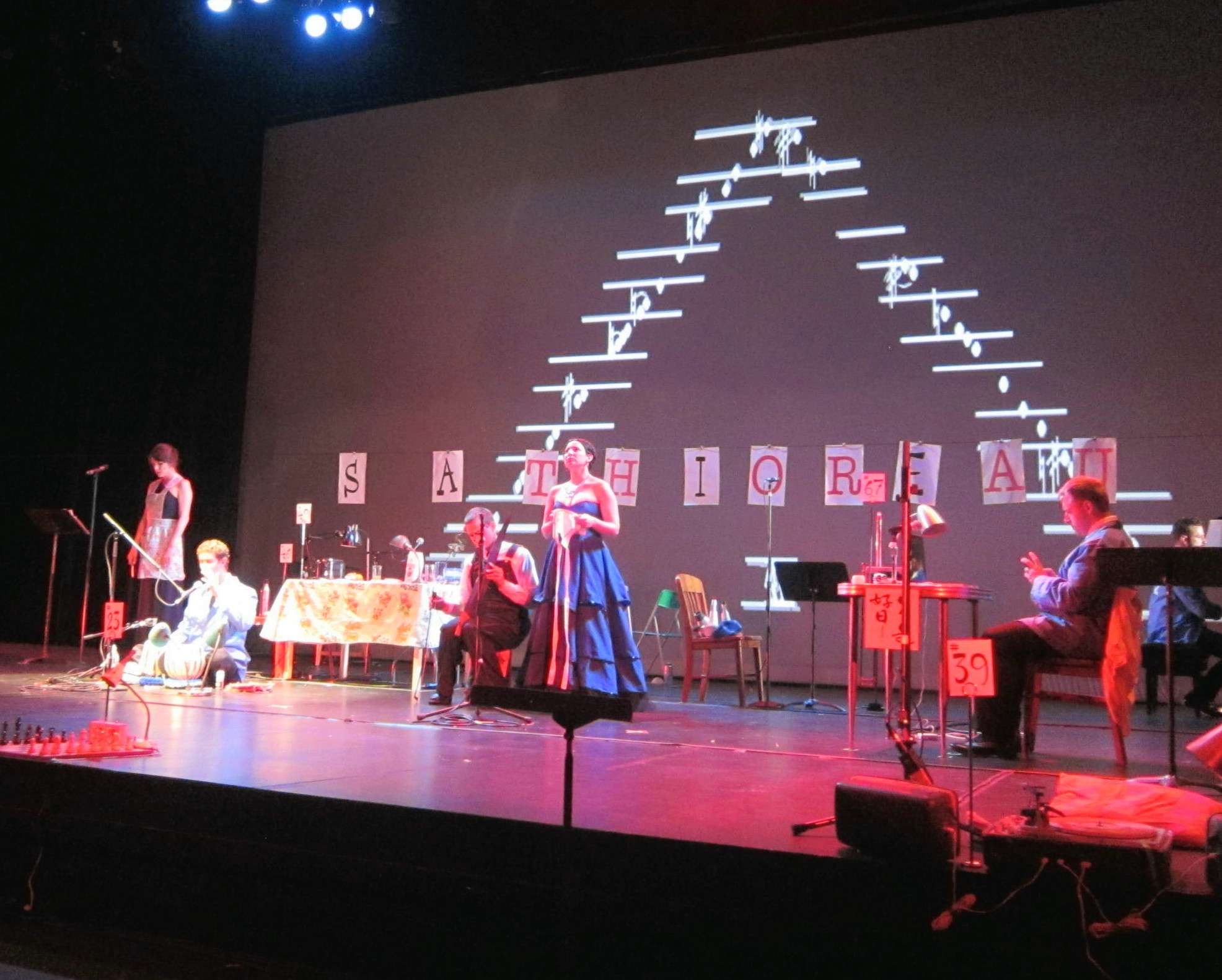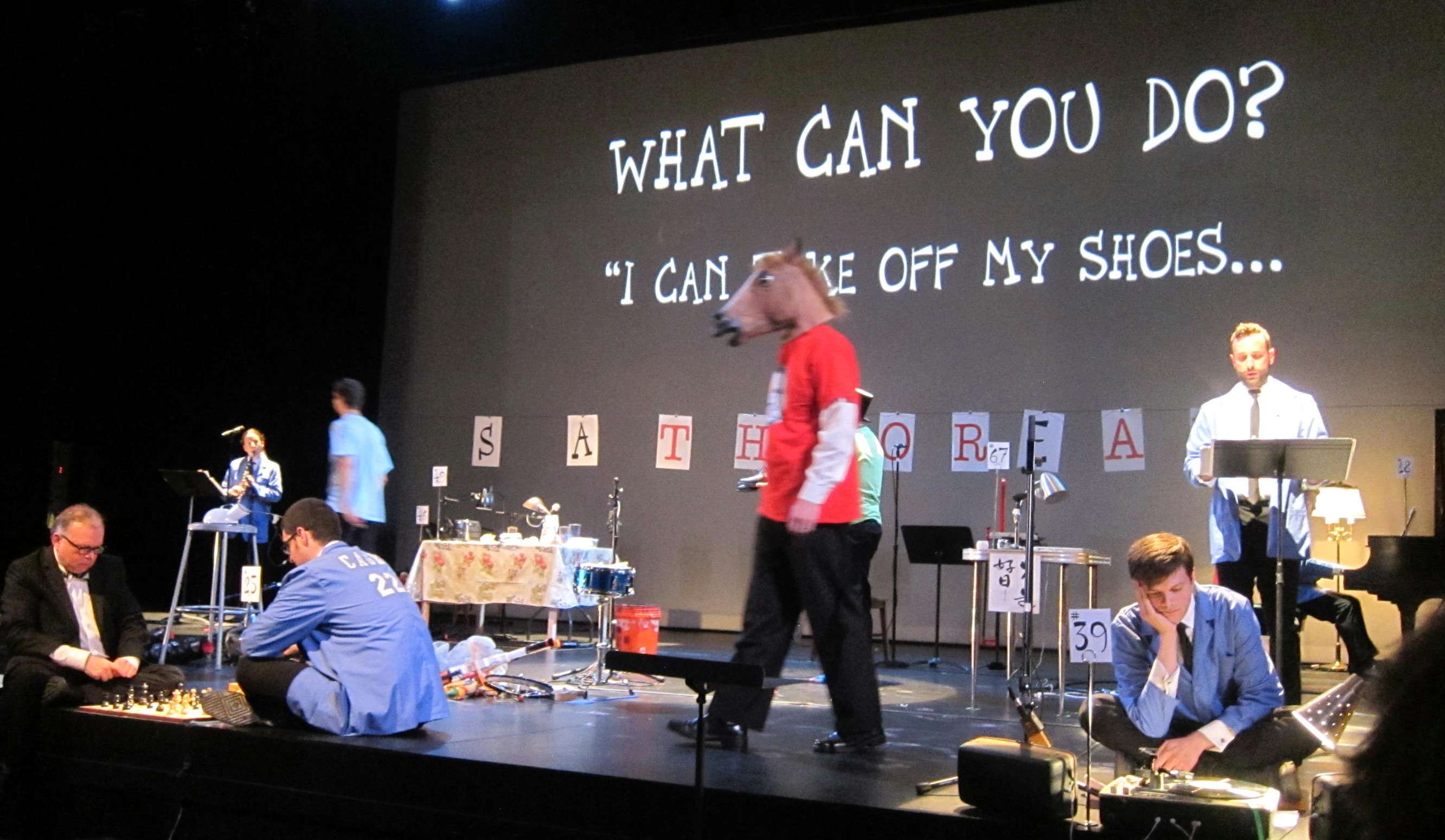|
Back
The Anarchy and the Ecstacy New York
Michael Schimmel Center for the Arts at Pace University
07/15/2012 - & June 9, 2012 (Amsterdam)
John Cage: Song Books (U.S. Premiere)
Alarm Will Sound: Erin Lesser (flute),
Elisabeth Stimpert (clarinet),
Matt Marks (horn), Michael Clayville (trombone), Payton MacDonald, Christopher Thompson (percussion), John Orfe (piano), Caleb Burhans (violin), Stefan Freund (violoncello), Miles Brown (double bass, electric bass), Mellissa Hughes, Martha Cluver, Peter Tantsits (voices), Rob Haskins (performer, musical direction)
Nigel Maister (conception, design, direction), Jason Price (sound design), Brent Felker (video design), Allen Hahn
(lighting design), Alan Pierson (artistic direction), Gavin Chuck (managing director), Jason Varvaro (production manager)
Co-commissioned by the Holland Festival and the River to River Festival

(© Coco T. Dawg)
Billed as an American premiere, this 1970 John Cage extravaganza was actually performed, in part, at Carnegie Hall four months ago with Jessye Norman, Meredith Monk, Michael Tilson Thomas, the San Francisco Symphony and a virtuoso cast. That 30-minute selection was exciting, clever, with futuristic lighting and a surrealistic aura radiated by its stars.
Alarm Will Sound is no ad hoc group assembled for a single work. But these 20 musicians...er, dancers...um, actors...oh, hell, these 20 theater people know each other so well, are so acutely aware of each move, each idiosyncrasy, that this, perhaps the pivotal (and certainly the most all-encompassing) piece of Cage was certainly more impressive as an ensemble piece. And fitting indeed for the finale for the multifarious 2012 River To River Festival.
At its apogee, Song Books was like that incredible New Yorker cartoon by James Thurber, of a juggler, holding up people holding up more people, holding up magicians, singers, trapezists holding up two pages of characters. (The bottom of the picture showed a dog pawing at the lowermost juggler leg.)
Anyhow, here, the stage at Pace University had simultaneously a skateboarder, roller-skater, singer, man-horse, giant videos of Thoreau’s Walden Pond, jitterbuggers, trombone player, musical saw-saw-er, papers thrown about, a piano, a flute, clarinet, and other characters–around 20–doing so many things, nost of which are illegible in my notes.
It was noisy, fun, unpredictable, a Cage “happening”, but with a purpose. John Cage had actually composed 90 “moments”, some visual, some theatrical, some electronic-theatrical. He quoted iconic characterser–Thoreau, Satie, Cummings, Duchamp, Joyce–and infinite motions, a feat of pure imagination.

J. Cage (© Herring Rollmop)
I had downloaded a thematic “guide” to these events, but it was obviously useless. And besides, I certainly didn’t want to look at this pdf file while all the happenings were going on.
But yes, we did have a video of Cage–one of them his famous television spot where he refixed a kitchen Cage style, another with his portrait morphing into that of Thoreau. Alarm Will Sound also incorporated many of the Cage insignias: dice, a chess game, a blackboard with quotes written and erased, and a whole host of singers singing words which were either decomposed or a tenor roaming through the audience with a fervent litany of glossolalia.
(The latter reminded me of a shaman I saw one midnight on an island in Korea, shouting her ancient Korean words to the waves.)
Much of this went a long way. As the sounds became more voluminous, as the events became more eventful, as the stage became filled with more paraphernalia, then suddenly, there was a stop.
A ceasing, a quietness. It was as if we had been roaming through a dense (and cacophonous) rainforest, filled with giant orchids, butterflies, snakes, cockroaches and birds-of-paradise...and suddenly the forest came to an end, and we were alone under a night sky with nothing around us.
Had this been the end, it would have been unsatisfying because it would have been so predictable. But Alarm Will Sound and John Cage hardly would have found this a comfortable ending. And as Musical Director Ron Haskins pointed out in his trenchant program notes, this was one of what could be many versions of Song Books.

(© Coco T. Dawg)
In this case, we were told to take out our Smartphones and put in some words, or video ourselves in the lobby (didn’t have one, and was exhausted, so stayed inside), and interact. Obviously, Mr. Cage would have approved of that
The last 30 minutes were not so chaotic, and thus not so interesting, A parody of opera singers, a noisy one-man chess game, a quote from Satie about his furniture music, a few symbolic banners...
I must confess this last part, because it was more clever, less anarchic, was less intriguing. And a second mea culpa, I was happy that it came to an end.
Equally happy, though, that Alarm Will Sound had the audacity, imagination, multiple talents and joy in theater to make Cage’s seminal super carnival not only live but become vibrant, animated, re-animated and always inspired.
Harry Rolnick
|